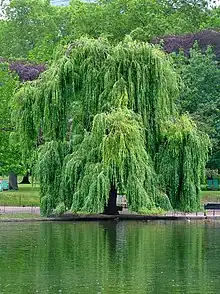ива
Old Ruthenian

Etymology
Inherited from Old East Slavic и́ва (íva), from Proto-Slavic *jь̀va, from Proto-Balto-Slavic *éiˀwāˀ, from Proto-Indo-European *h₁eyHwéh₂ (“yew”). Cognate with Russian и́ва (íva), Old Polish iwa, Old Church Slavonic ива (iva).
Noun
и҆́ва • (transliteration needed) f inan (related adjective и҆вовый)
Descendants
Further reading
- Voitiv, H. V., editor (2006), “ива”, in Словник української мови XVI – I пол. XVII ст. [Dictionary of the Ukrainian Language: 16ᵗʰ – 1ˢᵗ half of 17ᵗʰ c.] (in Ukrainian), issue 13 (и – іюнь), Lviv: KIUS, →ISBN, page 16
- Zhurawski, A. I., editor (1993), “ива”, in Гістарычны слоўнік беларускай мовы [Historical Dictionary of the Belarusian Language] (in Belarusian), issue 13 (злотництво – ивовый), Minsk: Navuka i tekhnika, →ISBN, page 287
Russian
Etymology
Inherited from Old East Slavic и́ва (íva), from Proto-Slavic *jь̀va, from Proto-Balto-Slavic *éiˀwāˀ, from Proto-Indo-European *h₁eyHwéh₂ (“yew”).
Slavic cognates include Bulgarian и́ва (íva), Ukrainian і́ва (íva) and Polish iwa. More distant cognates include Ancient Greek ὄᾱ (óā), Icelandic ýr, Dutch ijf, German Eibe, English yew.
Pronunciation
- IPA(key): [ˈivə]
Noun
и́ва • (íva) f inan (genitive и́вы, nominative plural и́вы, genitive plural ив, related adjective и́вовый)
Declension
Related terms
- ивня́к (ivnják)
- и́вовый (ívovyj)
Serbo-Croatian
Etymology
Inherited from Proto-Slavic *jь̀va, from Proto-Balto-Slavic *éiˀwāˀ, from Proto-Indo-European *h₁eyHwéh₂ (“yew”).
Pronunciation
- IPA(key): /ǐːʋa/
- Hyphenation: и‧ва
Declension
References
- “ива” in Hrvatski jezični portal